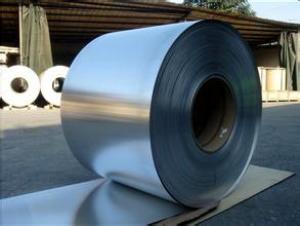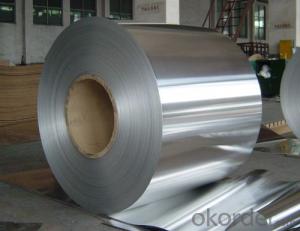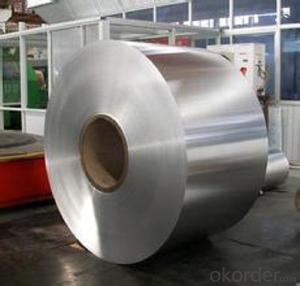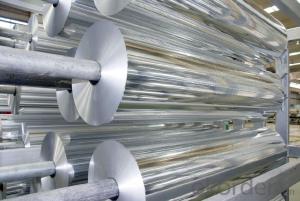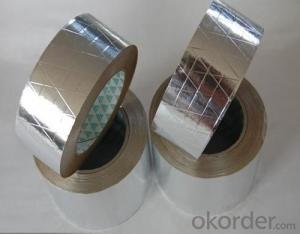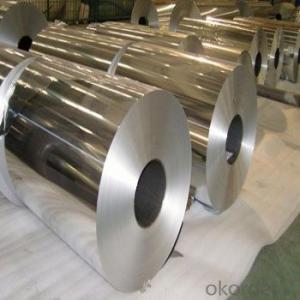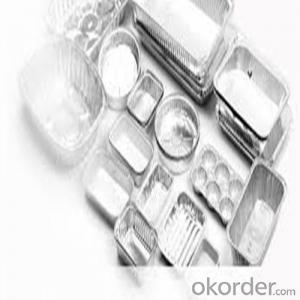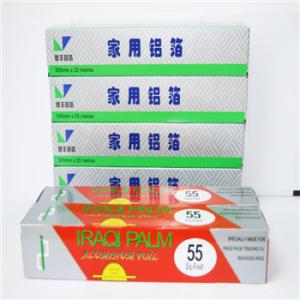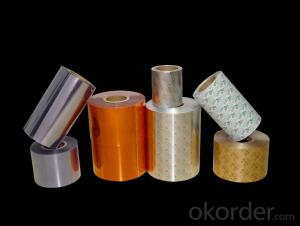Jumbo Aluminum Coil Roll - Aluminium Products
- Loading Port:
- China Main Port
- Payment Terms:
- TT OR LC
- Min Order Qty:
- -
- Supply Capability:
- -
OKorder Service Pledge
Quality Product, Order Online Tracking, Timely Delivery
OKorder Financial Service
Credit Rating, Credit Services, Credit Purchasing
You Might Also Like
Alloy: 1235/ 8011/ 8079
Temper: H14/H16/ H24/ H26
Thickness: 0.28mm-0.3mm(±0.01mm)
Width: 1000mm-2020mm(±1mm)
Core I.D:405/505/508mm
Standard: GB/T3198/ ASTM-B209
SURFACE QUALITY: GOOD APPEARANCE WITH NO-CRACK AND WELL-DISTRIBUTE GRAIN.
BUILD UP: TIGHT SLIT EDGES FREE FROM CRACKS, LAYER TO LAYER SHIFT NOT MORE THAN 2MM.
PROFILE: -0/+1%
FLATNESS: MILL FLATNESS COIL HAVING EDGE WAVINESS RATHER THAN CENTER BUCKLES SHALL BE ACCEPTABLE.
ROLLING PERFORMANCE: RE-ROLLABLE TO THE FINAL DESIRES GAUGES
- Q: Are there any limitations to the minimum coil width of aluminum coils?
- Yes, there are limitations to the minimum coil width of aluminum coils. The minimum coil width is determined by various factors, including the manufacturing process and the equipment used. Generally, the coil width is limited by the capabilities of the rolling mill or other processing machinery. The minimum coil width is typically determined by the size of the rolls or mandrels used in the production process. If the coil width is too narrow, it may cause issues with the stability and integrity of the coil, making it more difficult to handle and transport. Additionally, a narrower coil width may also affect the overall efficiency of the manufacturing process. Therefore, it is important to consider these limitations when determining the minimum coil width for aluminum coils.
- Q: Are aluminum coils suitable for architectural roofing systems?
- Yes, aluminum coils are suitable for architectural roofing systems. Aluminum is a popular choice for roofing due to its numerous advantages. Firstly, aluminum is lightweight, which makes it easier to handle during installation and reduces the load on the building's structure. Additionally, aluminum is highly durable and corrosion-resistant, making it a long-lasting option for architectural roofing systems. It also has excellent thermal properties, reflecting heat and reducing energy consumption. Moreover, aluminum coils can be easily shaped and formed into various profiles and designs, allowing for flexibility in architectural styles. Lastly, aluminum is a sustainable material as it is recyclable, making it an environmentally friendly choice for roofing systems. Overall, aluminum coils are a suitable and practical option for architectural roofing systems, providing durability, versatility, and energy efficiency.
- Q: What are the different forming processes for aluminum coils?
- Aluminum coils can be formed using various methods. These methods include: 1. The most commonly employed technique for forming aluminum coils is hot rolling. It requires heating the aluminum to a high temperature and then passing it between two large rolls to decrease its thickness. This process enables precise control over the coil's thickness and shape. 2. Cold rolling, a similar process to hot rolling, involves cooling the aluminum to room temperature before rolling it. Cold rolling is often preferred for producing coils with a smoother surface finish and stricter tolerances. 3. Continuous casting involves pouring molten aluminum into a continuous casting machine, which generates an uninterrupted strip of aluminum. The strip is then cooled and coiled to form aluminum coils. Continuous casting is commonly used for large-scale production. 4. Extrusion is a process that entails pushing aluminum through a die to create a particular shape or profile. The extruded aluminum is subsequently cooled and coiled to produce aluminum coils. Extrusion is frequently employed to manufacture coils with intricate shapes or profiles. 5. Slitting is a process used to cut aluminum coils into narrower strips. It involves passing the coil through a set of rotating blades that slice it into multiple smaller strips. Slitting is often utilized to produce coils with specific widths or for further processing. These are just a few examples of the various forming processes available for producing aluminum coils. The selection of a process depends on factors such as the desired shape, thickness, and surface finish of the coil, as well as considerations of production volume and cost.
- Q: Can aluminum coils be used in agricultural applications?
- Yes, aluminum coils can be used in agricultural applications. Aluminum is a versatile and durable material that can withstand various environmental conditions, making it suitable for agricultural equipment such as irrigation systems, greenhouse structures, and ventilation systems. Additionally, aluminum's light weight and corrosion-resistant properties make it an ideal choice for agricultural applications where durability and long-term performance are essential.
- Q: Can aluminum coils, which are typically used for industrial purposes, be utilized for baking pizza?
- <p>Aluminum coils, commonly used in industrial applications, are not recommended for baking pizza. While aluminum is a good conductor of heat and can be used in baking, aluminum coils are often too thick and not designed for direct contact with food. They may also contain coatings or treatments unsuitable for food. Instead, use aluminum foil or a pizza stone designed for baking to ensure food safety and even heat distribution.</p>
- Q: Can aluminum coils be used in the production of chemical storage tanks?
- Yes, aluminum coils can be used in the production of chemical storage tanks. Aluminum is a durable and corrosion-resistant material, making it suitable for containing various chemicals. Additionally, its lightweight nature allows for easier handling and installation of the storage tanks.
- Q: Are aluminum coils suitable for weather-resistant applications?
- Yes, aluminum coils are suitable for weather-resistant applications. Aluminum is known for its excellent corrosion resistance, making it a popular choice for outdoor and weather-exposed applications. The metal forms a protective oxide layer on its surface when exposed to air, which acts as a barrier against moisture, humidity, and other weather elements. This oxide layer helps prevent the metal from rusting or deteriorating over time. Additionally, aluminum's lightweight nature and high strength-to-weight ratio make it a practical choice for various weather-resistant applications, such as roofing, gutters, siding, and outdoor signage.
- Q: What are the potential applications of colored aluminum coils?
- The possible uses for colored aluminum coils are extensive and varied, spanning across a multitude of industries. In the realm of construction, these coils serve both practical and aesthetic functions. Whether utilized as roofing material, siding, or ornamental features on structures, they offer protection against the elements while simultaneously enhancing visual appeal. In the automotive industry, colored aluminum coils find application in the creation of car body panels. The material's vibrant hues and durability make it an appealing choice for crafting stylish and long-lasting exteriors for vehicles. Additionally, the electronics and electrical industries benefit from the use of colored aluminum coils. They serve as casings for electronic devices, such as smartphones, tablets, and laptops, lending a visually pleasing touch to these gadgets. Furthermore, due to aluminum's lightweight nature, it is well-suited for heat sinks and other cooling components in electronic devices. The packaging industry can also take advantage of colored aluminum coils to produce captivating packaging materials for various products. The vibrant colors and sleek appearance of aluminum can enhance the visual allure of consumer goods, attracting potential buyers. Moreover, the furniture industry can employ colored aluminum coils to fashion contemporary and stylish furniture pieces. Aluminum's versatility allows for the creation of unique designs and shapes, adding a modern touch to interior spaces. Lastly, the signage and advertising industry can benefit from colored aluminum coils. They can be utilized to create custom signage, billboards, and promotional displays with vivid and long-lasting colors, serving as effective marketing tools. In summary, colored aluminum coils have an array of potential applications in industries such as construction, automotive, electronics, packaging, furniture, signage, and advertising. Their durability, lightweight nature, and aesthetic appeal make them a versatile material for a wide range of purposes.
- Q: Its currently 3 AM so i can't check, but my question is:does aluminum rust slower/faster than other metals? I've basically had this bike for about 6 years, but only rid it once. Its been sitting in my backyard under a roof (safe from rain) for 6+ years. Is it safe to ride it? Also, bonus question: Does having a bike on campus make life 10x easier?
- Simple all alloy including aluminium turns to talcum powder which left will go black this is when the metal is oxidising. If the black is visible then scrap anything with it on. Have rescued many old bikes so things such as cables, tyres, tubes and your chain should be replaced as these usually suffer, if you are lucky these might still work. The chain will often freeze into a memory so won't turn, if not oiled may need hacksawed off. Most old bikes will reawaken with a few new or old replacement parts, also if will start to loosen with use so check it plus the bike will be desperately dry so to avoid component failure throw as much lubricant at it till it runs out and rejects it. The bike should only be sleeping so once wakened and sorted it will be as safe as you left it, though do check your brake blocks as these can split and perish. Steel parts can be replaced with alloy or treated with Kurust which gives rust a modern black component look. Have just woken a twenty five year old bike, once rebuilt it runs like a new bike plus is now safe as it has had various items modernised, something recommended for older bikes.
- Q: Can aluminum coils be used in the production of solar reflectors?
- Certainly! Solar reflectors can utilize aluminum coils in their production. Due to its exceptional reflectivity and durability, aluminum is widely employed in the manufacturing of these reflectors. The coils can be manipulated and molded into the desired shape for the reflector, facilitating efficient sunlight reflection onto the solar panels. Furthermore, aluminum's lightweight nature simplifies its handling and installation in solar reflector systems.
Send your message to us
Jumbo Aluminum Coil Roll - Aluminium Products
- Loading Port:
- China Main Port
- Payment Terms:
- TT OR LC
- Min Order Qty:
- -
- Supply Capability:
- -
OKorder Service Pledge
Quality Product, Order Online Tracking, Timely Delivery
OKorder Financial Service
Credit Rating, Credit Services, Credit Purchasing
Similar products
Hot products
Hot Searches
Related keywords
